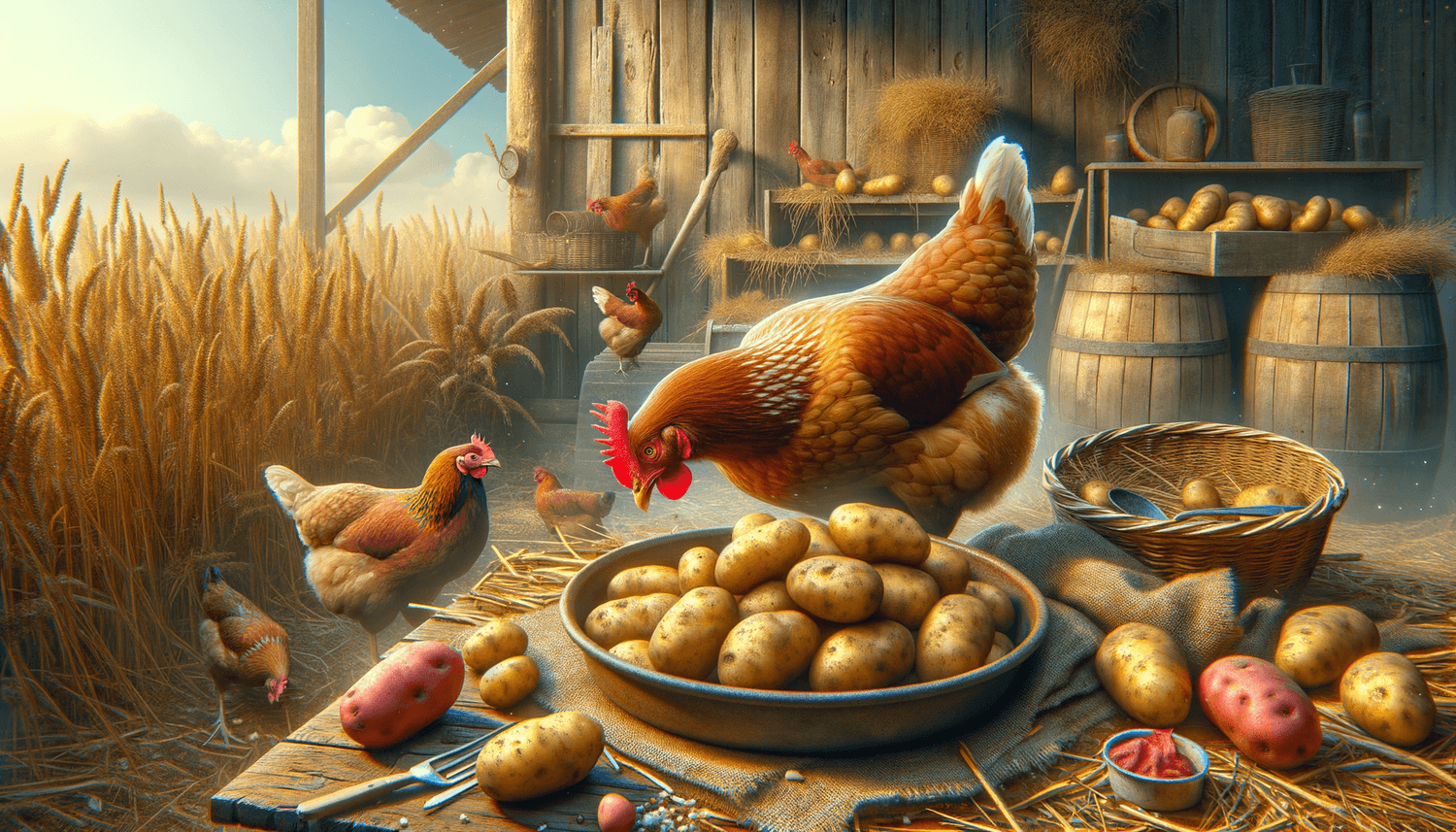Cluck cluck! You’ve got potato skins left from that scrumptious meal and you’re wondering if you can let your feathery friends share in the lip-smacking experience? In this blog post, we’ll dive into the fascinating world of whether backyard chickens can indulge in raw potato skins or not. We’ll discuss the importance of a balanced diet for their happiness and health, the yummy nutritional value that these veggie treasures hold, and if it’s worth adding these goodies to their menu or if they’re better off missing out. Let’s flap our wings together and embark on this peck-tacular journey to find the answer to this clucking good question!
Can chickens eat raw potato skins?
No, chickens should not eat raw potato skins, as they are not safe for your feathery friends. Raw potatoes, including their skins, contain a compound called solanine, which is toxic to chickens. Feeding them raw potato skins can lead to digestive issues, illness, or even death, so it is best to avoid giving them this particular treat.
A balanced diet for happy, healthy chickens
Just like us humans, chickens thrive on a balanced diet that caters to their specific nutritional needs. Maintaining this balance is essential for their overall health, growth, and egg production. A chicken’s diet should primarily consist of a high-quality chicken feed, which should make up around 80-90% of their diet.
Chicken feed is specially formulated with the right proportions of essential nutrients, vitamins, and minerals to meet the nutritional requirements of your feathered friends. In addition to chicken feed, the remaining 10-20% of their diet can consist of treats like fruits and vegetables. These treats not only add variety to their daily meals but also provide additional vitamins and minerals to supplement their nutrition.
Nutritional value of raw potato skins for chickens.
As previously mentioned, chickens should not eat raw potato skins due to the presence of solanine, a toxic compound that can cause serious health issues in chickens. This compound is found not only in the skin, but also in the flesh of green potatoes and sprouting portions. Solanine works as a natural insecticide and fungicide, protecting the plant from potential threats. However, consumption by chickens puts them at risk for potential harm.
It’s important to note that even if raw potato skins were safe for consumption by chickens, they do not hold enough nutritional value to make them a beneficial part of their diet. The potential health risks far outweigh any potential nutritional benefits. When considering treats and supplementary feeds for chickens, it is always best to provide them with safe and nutritious options that can complement their main chicken feed and contribute positively to their health and well-being.
Nutrition table of raw potato skins for chickens.
| Information | Description |
|---|---|
| Nutritional Value | Raw potato skins hold little nutritional value for chickens and contain solanine which is toxic. |
| Suggested Serving Size | Chickens should not be fed raw potato skins. |
| Safe Feeding Practices | Avoid feeding raw potato skins to chickens due to the presence of solanine. |
| Preparation | No preparation is recommended as raw potato skins should not be fed to chickens. |
| Potential Risks | Feeding raw potato skins can lead to digestive issues, illness, or even death due to solanine toxicity. |
| Hydration | Raw potato skins do not provide any significant hydration benefits for chickens. |
| Digestion | Raw potato skins can cause digestive issues in chickens due to the solanine content. |
| Seasonal Availability | Potato skins are not a recommended treat for chickens, regardless of their seasonal availability. |
| Other Benefits | There are no significant benefits of feeding raw potato skins to chickens as they pose health risks. |
Alternatives to raw potato skins
With raw potato skins being off the menu for your backyard chickens, you may be wondering what other treats you can safely offer them. There’s a wide range of healthy and delicious alternatives available that can delight your chickens while providing nutritional benefits. Some options include leafy greens, such as kale, spinach, and lettuce; fruits like berries, watermelon, and apples (without seeds); and vegetables such as carrots, cucumbers, and pumpkins.
Why cooked potatoes are better
While raw potato skins are not suitable for your chickens due to their solanine content, cooked potatoes are a safer and more nutritious option. Cooking potatoes helps to break down solanine, making them less toxic for your chickens. It’s important to note, however, that cooked potatoes should be thoroughly cooled before serving and should not have any added salt or spices that may upset a chicken’s digestive system.
Watch those extras
Lastly, when offering treats and extras to your backyard chickens, remember to practice moderation. Even healthy alternatives should only make up around 10-20% of their overall diet, as too many treats can lead to imbalances in their nutrition. Always keep their primary chicken feed as the foundation of their diet, and make sure they have access to fresh water at all times to maintain optimum health and well-being.

















